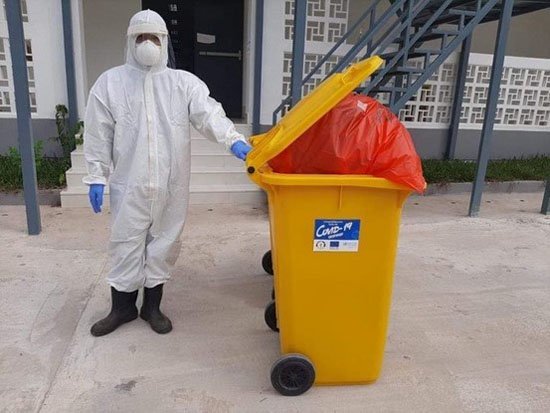
Hazardous waste in response to the COVID-19 pandemic is shown.
File Photo courtesy of Ministry of Health, Lao People's Democratic Republic
Feb. 1 (UPI) -- COVID-19 medical waste has strained waste management systems, exposing a "dire need" for improvement, the World Health Organization said Tuesday.
"Tens of thousands of tons of extra medical waste from the response to the COVID-19 pandemic has put tremendous strain on healthcare waste management systems around the world, threatening human and environmental health and exposing a dire need to improve waste management practices," WHO said in a statement on its 71-page report on the matter.
The report said that medical waste produced since the beginning of the COVID-19 pandemic in March 2020 included masks, gloves, gowns, vaccine vials and needles, COVID-19 tests, and plastic packaging and containers. Approximately 87,000 tons of personal protective equipment was procured during that period and shipped to countries in response to the pandemic, the WHO global analysis shows.
The report also emphasized that 140 million test kits have been shipped, with the potential to generate 2,600 tons of non-infection waste, mainly plastic, and 731,000 liters of chemical waste, equivalent to one-third of an Olympic-size swimming pool.
Also, 8 billion doses of vaccine administered globally have produced 144,000 tons of additional waste from syringes, needles and safety boxes, the report said.
As the United Nations and member states faced the urgent need to secure supplies for healthcare facilities battling the emerging pandemic in March 2020, they paid less attention to safe healthcare waste management practices, the WHO said.
Thirty percent of healthcare facilities, the majority of which are in the least developed countries, were not equipped to handle existing waste loads, let alone the extra COVID-19 load, the statement on the report noted.
The inability to handle the extra COVID-19 waste could potentially expose healthcare workers to "needlestick injuries, burns and exposure to pathogenic micro-organisms," the report said.
It may also expose people living in communities near "poorly managed landfills" to "contaminated air, poor water quality or disease-carrying pests," the report added.
"COVID-19 has forced the world to reckon with the gaps and neglected aspects of the waste stream and how we produce, use and discard of our healthcare resources, from cradle to grave," Dr. Maria Neira, WHO director of Environment, Climate Change and Health, said in the statement. "Significant change at all levels, from the global to the hospital floor, in how we manage the healthcare waste stream is a basic requirement of climate-smart healthcare systems, which many countries committed to at the recent U.N. Climate Change Conference, and, of course, a healthy recovery from COVID-19 and preparedness for other health emergencies in the future."
The report's recommendations included promoting and investing in more sustainable PPE and waste systems, supporting behavior change away from single use and overuse of PPE to appropriate use and reusables when feasible, safe and sustainable waste management training for waste workers, and gradually improving waste treatment technologies.
Feb. 1 (UPI) -- COVID-19 medical waste has strained waste management systems, exposing a "dire need" for improvement, the World Health Organization said Tuesday.
"Tens of thousands of tons of extra medical waste from the response to the COVID-19 pandemic has put tremendous strain on healthcare waste management systems around the world, threatening human and environmental health and exposing a dire need to improve waste management practices," WHO said in a statement on its 71-page report on the matter.
The report said that medical waste produced since the beginning of the COVID-19 pandemic in March 2020 included masks, gloves, gowns, vaccine vials and needles, COVID-19 tests, and plastic packaging and containers. Approximately 87,000 tons of personal protective equipment was procured during that period and shipped to countries in response to the pandemic, the WHO global analysis shows.
The report also emphasized that 140 million test kits have been shipped, with the potential to generate 2,600 tons of non-infection waste, mainly plastic, and 731,000 liters of chemical waste, equivalent to one-third of an Olympic-size swimming pool.
Also, 8 billion doses of vaccine administered globally have produced 144,000 tons of additional waste from syringes, needles and safety boxes, the report said.
As the United Nations and member states faced the urgent need to secure supplies for healthcare facilities battling the emerging pandemic in March 2020, they paid less attention to safe healthcare waste management practices, the WHO said.
Thirty percent of healthcare facilities, the majority of which are in the least developed countries, were not equipped to handle existing waste loads, let alone the extra COVID-19 load, the statement on the report noted.
The inability to handle the extra COVID-19 waste could potentially expose healthcare workers to "needlestick injuries, burns and exposure to pathogenic micro-organisms," the report said.
It may also expose people living in communities near "poorly managed landfills" to "contaminated air, poor water quality or disease-carrying pests," the report added.
"COVID-19 has forced the world to reckon with the gaps and neglected aspects of the waste stream and how we produce, use and discard of our healthcare resources, from cradle to grave," Dr. Maria Neira, WHO director of Environment, Climate Change and Health, said in the statement. "Significant change at all levels, from the global to the hospital floor, in how we manage the healthcare waste stream is a basic requirement of climate-smart healthcare systems, which many countries committed to at the recent U.N. Climate Change Conference, and, of course, a healthy recovery from COVID-19 and preparedness for other health emergencies in the future."
The report's recommendations included promoting and investing in more sustainable PPE and waste systems, supporting behavior change away from single use and overuse of PPE to appropriate use and reusables when feasible, safe and sustainable waste management training for waste workers, and gradually improving waste treatment technologies.
No comments:
Post a Comment